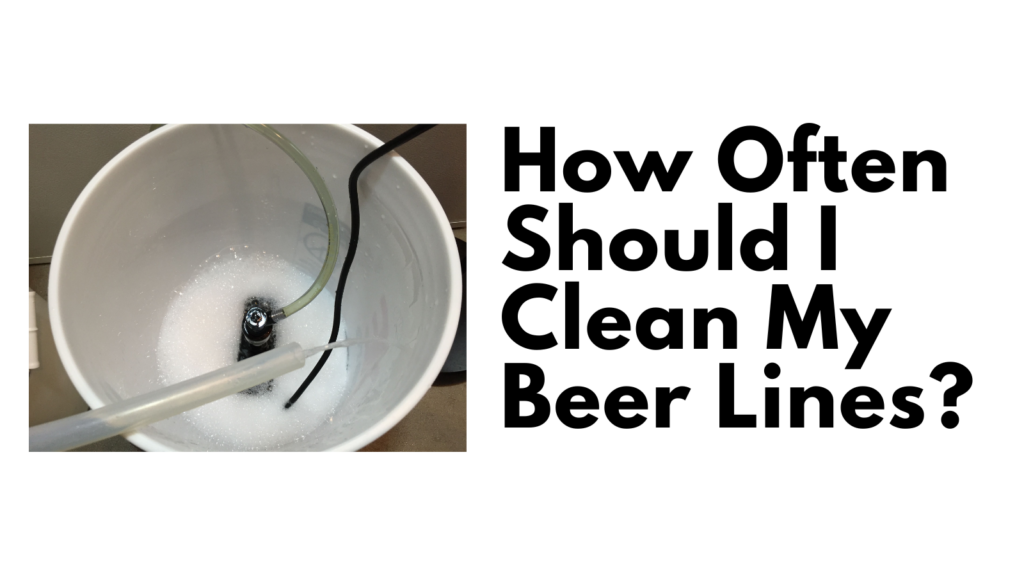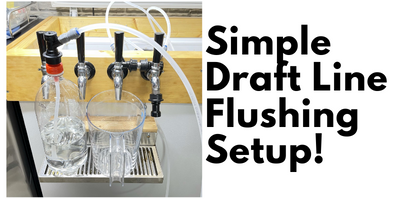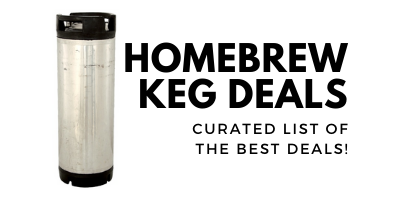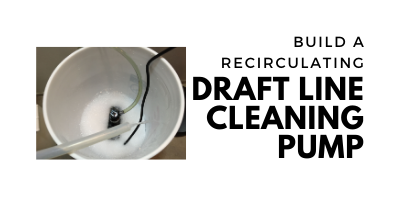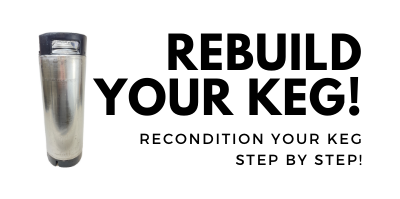
How Often Should I Clean My Kegerator Beer Lines?
Clean kegerator lines are a key part of serving delicious beer. Bacteria and mineral build in lines can cause off flavors, quick loss of head, under-carbonated beer due to rapid co2 loss and lack of legs forming on the inside of your beer glass.
How Often Should I Clean My Beer Lines?
The Draught Quality Beer Manual says… every two weeks.
That recommendation is for a commercial operation. What about homebrewers? We serve far fewer beer on our kegerators, but on the other hand, we can have been on tap and in lines 24 hours a day and 7 days a week. Considering all of this, my recommendation is to clean home kegerator beer lines every 1 to 2 months.
Line Cleaning Options
Our Line Cleaning Builds:
- Build A Recirculating Draft Line Cleaning Pump – a ground up build of a recirculating draft line cleaner. No hand pumps and cleans everything including the faucet!
- Mark II Keg and Carboy Cleaner Draft Line Cleaning Pump Conversion – a simple modification of the very popular Mark II Keg and Carboy Cleaner that allows it to clean beer lines. No hand pumps and cleans everything including the faucet!
- Building a Simple Ball Lock Draft Line Flushing Setup – a quick line flushing setup. Not as robust of a setup, but I recommend this for a quick flush in between deep cleans
This article contains affiliate links. We may make a small percentage if you use our links to make a purchase. You won’t pay more and you’ll be supporting Homebrew Finds and more content like this. Thank you for your support!
Kegland Ball Lock Line Cleaning Pump
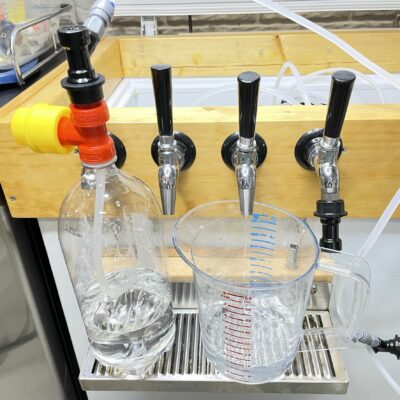
Kegland Ball Lock Cleaning Kit is a simple and reasonably priced hand pump that’s designed to work with Ball Lock setups.
Hands on Review: Kegland Ball Lock Cleaning Kit
via William’s Brewing
- PET Bottle Dispensing Pump
- Ball Lock Cleaning Kit – includes pump, 2.5L PET Bottle & BLC
- 2.5 Liter PET Growler Bottles – via William’s Brewing
- Carbonation Cap Tee Adapter
- Red Carbonation & Cleaning Cap
via MoreBeer
- Ball Lock Line Cleaning Kit w/ Mini Party Pump KG503
- Carbonation and Line Cleaning Ball Lock Cap – Plastic FE133
- Carbonation Ball Lock Cap Tee Fitting KG501
Related: Hands on Review: Kegland 2.5 Liter Growlers
More Commercially Available Options
- Beer Line Cleaning Kit – via Keg Connection
- Ball Lock Homebrew Line Cleaning Kit – via Keg Connection
- Sankey Beer Line Cleaning Kit – via William’s Brewing
- Kegco Deluxe Hand Pump Pressurized Keg Beer Cleaning Kit affiliate link, note that multiple variations of this product may be available, as such a different version may appear at this link
- Bar King’s UPDATED Home Brew Cleaning Kit affiliate link, note that multiple variations of this product may be available, as such a different version may appear at this link
- Beer Line Cleaning Kit D1600 – to use this you disconnect your faucet
- Beer Line Cleaning Pump D1601 – same pump as D1600, just the pump
- Keg Coupler Adapter for Beer Line Cleaning Kit D1603 – this adapter works with MoreBeer’s cleaning kit and allows you to connect directly to a sanke d style coupler
- Search Amazon for “beer line cleaner” to shop around
Cleaning Multiple Lines at the Same Time
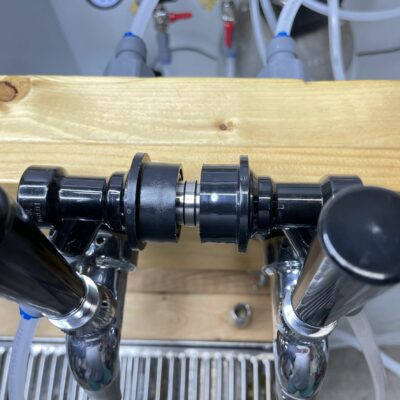 See: Cleaning Multiple Kegerator Lines at the Same Time
See: Cleaning Multiple Kegerator Lines at the Same Time
Draft Line Cleaning Solutions and Sanitizers
- National Chemical Keg Beer Line Cleaner for Kegerators 32 oz Bottle
- Search Amazon for “BLC Line Cleaner”
- Tank and Line Cleaner (30) – 30 pre-measured packs
- 32oz. BLC Liquid Line Cleaner – via Keg Connection
- LLC – Liquid Line Cleaner via MoreBeer
- TLC Tank & Line Cleaner – 1 lb. CL38 – via MoreBeer
- Search Amazon for “Star San”
- Search Amazon for “PBW”
Build a Simple Draft Line Flushing Setup
Keg Deals!
kegdealsBuild a Recirculating Draft Line Cleaner
Rebuild Your Kegs!
The Importance of Draught Beer Line Cleaning – from the Brewers Association
Clean beer lines are integral to maintaining the quality of craft beer.
Small and independent craft brewers devote a lot of time, effort and resources to make the best possible beer for consumers. Ingredients are handpicked, the latest technological advances in brewing are used and batches of beer are tested throughout the process to ensure superior quality. That hard work can be ruined in the time it takes the beer to travel from the keg to the glass if the draught system/lines have not been properly cleaned and maintained.”
- At a minimum, you should clean your draught line every two weeks with an alkaline detergent cleaner to remove protein and films that build up quickly.
- The cleaning chemical should be recirculated through the product line for a minimum of 15 minutes at a velocity up to two gallons/minute. Soaking product lines is not recommended, but the cleaning solution should be left in-line for at least 20 minutes if recirculation is not an option.
- All faucets should be completely disassembled and cleaned every two weeks. Make sure to replace any damaged seals or gaskets.
- Acid cleaning should be performed quarterly to remove inorganic compounds such as “beer stone,” which are mineral deposits.
- All vinyl jumpers and vinyl direct draw lines should be replaced annually.
- Couplers should be replaced based on condition. Inspect the coupler bottom seal and O-rings, to make sure they are properly lubricated with a food-grade lubricant.
- Good quality, well-maintained couplers, faucets and shanks can last a lifetime. Parts that are 100 percent stainless steel are the most reliable and will provide the best quality experience for your staff and customers.
- Always make sure to rinse lines with clean water after cleaning!
- Draught lines may need to be replaced after pouring root beer, fruit or pepper-flavored beers, sour beers, margaritas or ciders in order to avoid permanent flavor influence.
Read the complete article: THE IMPORTANCE OF DRAUGHT BEER LINE CLEANING
Also Consider:
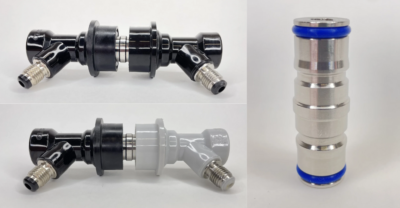 Stainless Steel Ball Lock Jumper with Food Grade Silicone O-Rings: Allows you to connect multiple ball lock runs to clean multiple lines and taps at the same time. Works with both liquid and gas QDs. Stainless Steel Ball Lock Jumper – via Valuebrew – An easy add-on… food grade o-rings, featured in our Keg Rebuild Post
Stainless Steel Ball Lock Jumper with Food Grade Silicone O-Rings: Allows you to connect multiple ball lock runs to clean multiple lines and taps at the same time. Works with both liquid and gas QDs. Stainless Steel Ball Lock Jumper – via Valuebrew – An easy add-on… food grade o-rings, featured in our Keg Rebuild Post
More Homebrew Finds!
- Last 50 Finds!
- Top Deals – a curated list of the best deals
- Homebrew Reviews – one of the largest libraries of homebrew reviews in existence!
- Our Top Posts – tips, how-tos, resources posts and more
- Let’s be Friends!
Recent Deals!
10 Most Recent Homebrew Resource Posts & How-To’s!
We are Homebrew Review HQ! Our 10 Most Recent Reviews
Also: Kegerator Tips & Gear | Keg Repair Part #s | Recent Keg Finds
Our Top Draft Resources!
Check our our Top Draft Related Resources- Commentary: Pin Lock Keg Pricing and Availability
- Check Your CO2 Regulator for Leaks!
- How to get a keg ready for first use? New Keg Cleaning and Prep
- Portable Draft Beer Serving Options!
- Pin Lock Keg Pricing and Availability
- The Most Difficult Spot to Check for CO2 Leaks
- Keg O-Ring Materials Selection! – EPDM, Silicone and Buna-N?
- Why Do I Have Bubbles in My Beer Line? Diagnosing and Fixing Kegerator Foam Problems
- Five Benefits of Using Corny Kegs As Fermenters
- Rebuilding & Reconditioning Homebrew Kegs!
- Food Safe Replacement Keg O-Rings in Bulk
- Hands on Review: Kegland DuoTight Fittings & EVABarrier Tubing!
- Why Won’t My Beer Carbonate? Fixing Draft Beer Carbonation Problems
- What Does a Flow Control Faucet Do?
- Upgrade Your Kegerator – 6 Improvements!
- Serve Homebrew on Any Kegerator & Convert Commercial Kegerator to Homebrew
- Tips and Gear for Growler Filling
- What’s the Difference Between Ball Lock Kegs and Pin Lock Kegs?
- Checking for Draft System CO2 Leaks – Using The Pressure Gauge Method
- Tip: Consider Oetiker Stepless Clamps for Kegerator Gas and Beer Lines
- Hands On Review: Inkbird ITC-308 Dual Stage Temperature Controller +WiFi Version
- Universal Poppets Tips and Tricks!
- Convert Your Mark II Keg & Carboy Washer to a Recirculating Draft Line Cleaning Pump!
- Step by Step: Finding and Fixing Keg CO2 Leaks
- Kegerator Temperature Probe Placement – To Immerse or Not To Immerse? – three tests to determine optimal pla…
- Kegerator Beer Line Temperatures & Reducing Foam with a Recirculating Fan
- Kegging CO2 Use Estimations and Calculations
- Balancing Your Kegerator Draft System
- Building a Simple Ball Lock Draft Line Flushing Setup
- Build a Recirculating Draft Line Cleaning Pump
- Home Brew Keg Roundup – New & Used, 5 and 2.5 Gallon & More!
- Damp Kegerator? Fix Kegerator Condensation
- Homebrew Temp Controller Roundup! – Kegerator and Fermentation – concepts, applications and models
- Bulk Keg Orings and Keg Parts Reference
This post may contain affiliate links. We may make a commission when you use our links. This will never cost you extra. Thank you for supporting Homebrew Finds!
greatdealsPrice, promotions and availability can change quickly. Check the product page for current price, description and availability.
Make sure the components you use are compatible and rated for your intended application. Contact manufacturer with questions about suitability or a specific application. Always read and follow manufacturer directions. tag:lnksfxd toppost:howoften similar to tag:xlinecleaning tag:tpr
